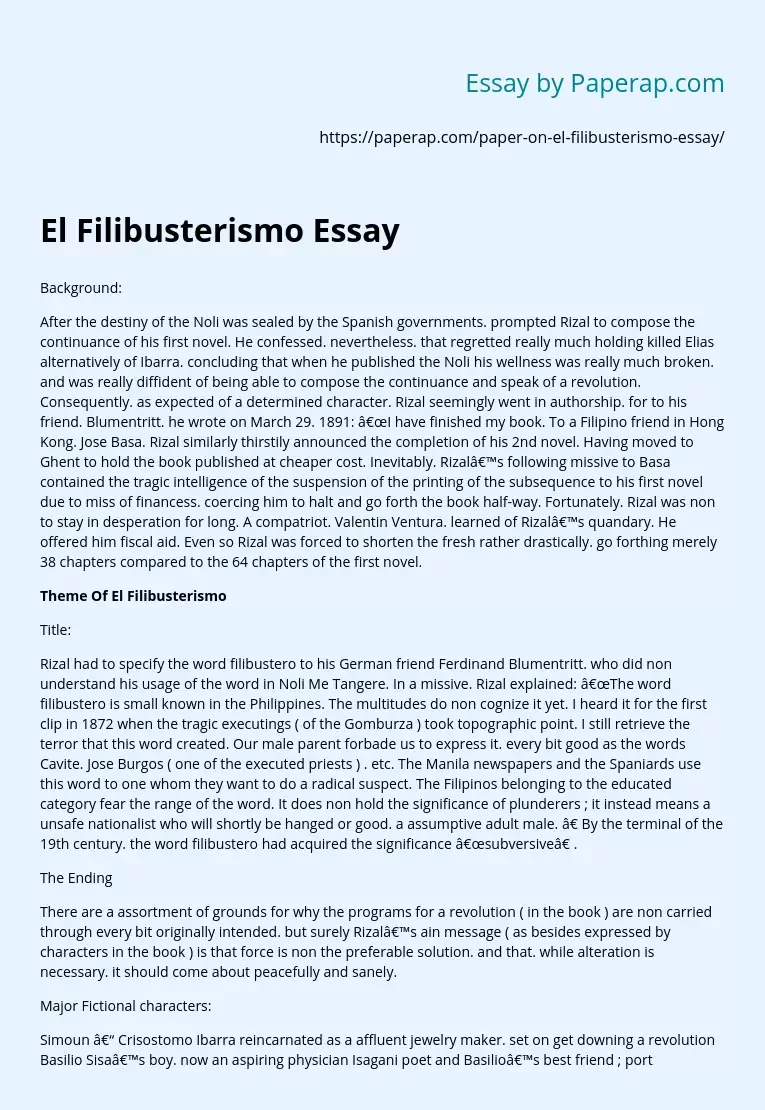El Filibusterismo Essay
Background:
After the destiny of the Noli was sealed by the Spanish governments. prompted Rizal to compose the continuance of his first novel. He confessed. nevertheless. that regretted really much holding killed Elias alternatively of Ibarra. concluding that when he published the Noli his wellness was really much broken. and was really diffident of being able to compose the continuance and speak of a revolution. Consequently. as expected of a determined character. Rizal seemingly went in authorship. for to his friend.
Blumentritt. he wrote on March 29. 1891: “I have finished my book. To a Filipino friend in Hong Kong. Jose Basa. Rizal similarly thirstily announced the completion of his 2nd novel. Having moved to Ghent to hold the book published at cheaper cost. Inevitably. Rizal’s following missive to Basa contained the tragic intelligence of the suspension of the printing of the subsequence to his first novel due to miss of financess. coercing him to halt and go forth the book half-way.
Fortunately. Rizal was non to stay in desperation for long. A compatriot. Valentin Ventura. learned of Rizal’s quandary. He offered him fiscal aid. Even so Rizal was forced to shorten the fresh rather drastically. go forthing merely 38 chapters compared to the 64 chapters of the first novel.
Theme Of El Filibusterismo
Title:
Rizal had to specify the word filibustero to his German friend Ferdinand Blumentritt. who did non understand his usage of the word in Noli Me Tangere. In a missive. Rizal explained: “The word filibustero is small known in the Philippines.
The multitudes do non cognize it yet. I heard it for the first clip in 1872 when the tragic executings ( of the Gomburza ) took topographic point. I still retrieve the terror that this word created. Our male parent forbade us to express it. every bit good as the words Cavite. Jose Burgos ( one of the executed priests ) . etc. The Manila newspapers and the Spaniards use this word to one whom they want to do a radical suspect. The Filipinos belonging to the educated category fear the range of the word. It does non hold the significance of plunderers ; it instead means a unsafe nationalist who will shortly be hanged or good. a assumptive adult male. ” By the terminal of the 19th century. the word filibustero had acquired the significance “subversive” .
The Ending
There are a assortment of grounds for why the programs for a revolution ( in the book ) are non carried through every bit originally intended. but surely Rizal’s ain message ( as besides expressed by characters in the book ) is that force is non the preferable solution. and that. while alteration is necessary. it should come about peacefully and sanely.
Major Fictional characters:
Simoun – Crisostomo Ibarra reincarnated as a affluent jewelry maker. set on get downing a revolution Basilio Sisa’s boy. now an aspiring physician Isagani poet and Basilio’s best friend ; portrayed as emotional and reactive Kabesang Tales – Telesforo Juan de Dios. a former cabeza de barangay ( barangay caput ) who resurfaced as the feared Luzon brigand Matanglawin Paulita Gomez the girlfriend of Isagani and the niece of Dona Victorina. In the terminal. she and Juanito Pelaez are wed. and she dumps Isagani. believing that she will hold no hereafter if she marries him Father Florentino Isagani’s godfather. and a secular priest ; was engaged to be married. but chose the priesthood alternatively Don Custudio a celebrated journalist who was asked by the pupils about his determination for the Academia de Castellano. In world. he is rather an ordinary chap who married a rich adult female in order to be a member of Manila’s high society Ben Zayb
Abraham Ibanez is his existent name. He is a journalist who thinks he is the lone one thought in the Philippines
hypertext transfer protocol: //www. kapitbisig. com/philippines/el-filibusterismo-the-reign-of-greed-by-dr-jose-rizal-book-notes-summary-in-english-the-characters-the-summary-of-el-filibusterismo_202. html hypertext transfer protocol: //joserizal. ph/fi01. hypertext markup language
El Filibusterismo Essay. (2019, Dec 05). Retrieved from https://paperap.com/paper-on-el-filibusterismo-essay/

